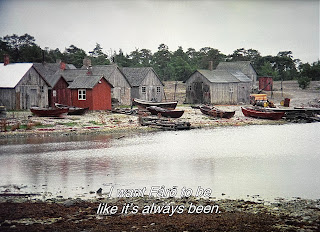The Flora, Fauna, and People of Bergman Island
Ingmar Bergman heralded in the Seventies with a superb hour-long documentary portrait of his latter-day adopted home; Fårö Document [Fårö Dokument] premiered on Swedish TV on January 1st, 1970. ("Fårö"'s pronunciation, counterintuitively for English-speakers perhaps, comes close to "Fora.") "Fårö has the same relationship to Gotland as Gotland does to Sweden," explains a man among many filmed for multiple black-and-white one-on-one interviews Bergman conducts with his townsfolk. (Gotland is a Swedish island much larger [relatively speaking] than Fårö.) This undertaking gives credence to my belief that agrarian life in general fascinates bourgeois artists, because it belongs to the "how the other half live" tip, and they're discreetly happy the subjects' lives are not their own. Well, a combination of that and an attraction to the natural and harsh beauty of the environs and respective properties. Anyway, Bergman outside his own mind is a genial enough personality who allows the Fåröfolk to open up and proclaim their (sometimes ambivalent) love for the land upon which they've grown. I'd think it almost impossible to describe the island's landscape without resorting to florid, MFA-sanctioned naturalism'y prose; the images and the testimonials (often edited employing subtle jump-cuts, which nowadays would be replaced with a method of smashing-together the seams, like fast lap-dissolves via nonlinear interpolation in Premiere or Final Cut Pro) alone speak to the hard facts of the countryside. Bergman himself has already filled in many blanks with his previous films set here. Fårö must go down in history as his own Monument Valley.
And, as with Ford, these monuments figure not just as awesome testaments to the power of erosion, but as tombstones, too. As in other films, the sequence of the slaughtering of the sheep, the lambs, evinces a fact of life, the reality of eating appearing itself as an abstraction, at least to the necessarily self-appointed butchers. It's part of a humane cycle, and it cannot be escaped anymore than the prerequisite of gutting a fish. Real blood on the fur, unlike in L 182 (A Passion) — bulbous sacks of fat and guts.
One resident describes the effect of the tourist population on Fårö (and mind you, to this day, the semi-christened Bergman Island is no easy reach) with as much a descriptor of their attitudes as a warning-off: "No-one will enjoy it here."
We meet a 102-year-old man who looks twenty years younger than his actual age, and an assistant vicar, a real pill, who sports a greyscale golden ring on his right middle finger. Never trust men with fitful rings. He himself belies a porcine quality, naturally...
At mention of the children losing their religion, in the discussion between Bergman and the ringed porcine vicar, Bergman cuts to color stock again to a schoolbus of children uncertain of their futures remaining on the island, as rock music plays on the soundtrack.
Bergman understands that the new generation wants color, man, and the stodgy mayor can't provide any ideas to curtail the population leakage except, like, maybe building a youth center? •
===
Other writing on Ingmar Bergman at Cinemasparagus:
Kris [Crisis, 1946]
Skepp till India Land [Ship to India, 1947]
Hamnstad [Port of Call, 1948]
Törst [Thirst, 1949]
Till glädje [To Joy, 1950]
Sommarlek [Summer Interlude, 1951]
Kvinnors väntan [Women's Waiting, 1952]
Sommaren med Monika [Summer with Monika, 1953]
Gycklarnas afton [Carnies' Twilight, aka Sawdust and Tinsel, 1954]
En lektion i kärlek [A Lesson in Love, 1954]
Kvinnodröm [Women's Dream, aka Dreams, 1955]
Sommernattens leende [Smile of the Summer Night, 1955]
Det sjunde inseglet [The Seventh Seal, 1957]
Smultronstället [The Wild Strawberry Patch, aka Wild Strawberries, 1957]
Nära livet [On the Brink of Life, aka Brink of Life, 1958]
Ansiktet [The Face, aka The Magician, 1958]
Jungfrukällan [The Virgin Spring, 1960]
Djävulens öge [The Devil's Eye, 1960]
Såsom i en spegel [As in a Mirror / Through a Glass Darkly, 1961]
Nattvardsgästerna [The Communicants, aka Winter Light, 1962]
För att inte tala om alla dessa kvinnor [Not to Mention All These Women, 1964]









































































